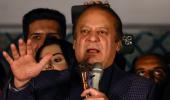The top leaders of the Pakistan Muslim League-Nawaz and the Pakistan Peoples Party have discussed a new power-sharing formula for dividing the five-year tenure between them, as efforts to form a coalition government gathered pace on Monday following a split verdict in the elections.

Despite independent candidates backed by jailed former prime minister Imran Khan's Pakistan Tehreek-e-Insaaf party winning the most seats in Parliament, questions loom over what the next government of Pakistan will look like.
None of the three major parties, the PML-N, the PPP, or the PTI have won the necessary seats to secure a majority in the 266-member National Assembly and, therefore, will be unable to form government on their own, leaving it unclear who will be picked as the cash-strapped country's next prime minister.
The leaders of PML-N and the PPP discussed the idea of appointing a prime minister for half the term during their first meeting held on Sunday following the February 8 elections as part of their efforts to form a coalition government in the Centre and provinces, according to a source privy to the development.
“It has been proposed that a PML-N candidate will serve as prime minister for three years and PPP's leader for two years,” the source said, adding that it was not yet decided who will get the first term.
The meeting was attended by PPP-Parliamentarian President Asif Ali Zardari, PPP Chairman Bilawal-Bhutto Zardari, and former prime minister Shehbaz Sharif from the PML-N.
The same power-sharing formula was chalked out by PML-N and National Party in Balochistan in 2013 when two chief ministers from the two parties held office for half of the five-year term.
PML-N supremo Nawaz Sharif is still in the race for the prime ministerial slot despite his party not securing a simple majority in the Feb 8 general elections in Pakistan, some PML-N leaders said on Monday.
“We are having discussion with the PPP over power-sharing formula in the upcoming coalition government in the Centre and Nawaz Sharif cannot be ruled out as the prime ministerial candidate,” PML-N Senator Irfan Saddique told a private news channel.
He said Nawaz Sharif, 74, is the candidate for the prime minister slot from the PML-N.
In the Sunday meeting at the Bilawal House in Lahore, the two sides agreed in principle to cooperate for the country's political stability following the general election, the sources said.
They confirmed that so far several open and behind-the-doors meetings have been held between the leaders of PML-N and PPP and other parties since the powerful Pakistan Army has also indicated that they will back a unity government to pull the country out of the challenges it faced.
“The main hurdle is who will lead the government as both parties are pushing forward their candidates but after a lot of discussion, some sort of middle ground may emerge,” according to a leader of the PML-N.
A PPP leader said the party was not withdrawing from its demand that Bilawal Bhutto Zardari should be the prime minister because he was endorsed for the post by the PPP's Central Executive Committee even before the elections.
The Election Commission of Pakistan has announced that independent candidates, a majority of them supported by the PTI secured 101 seats, followed by Pakistan Muslim League-Nawaz with 75 seats, Pakistan Peoples Party getting 54 seats, and Muttahida Qaumi Movement-Pakistan bagging 17 seats.
Other parties got 17 seats while the result of one constituency was withheld.
Though the PTI initially claimed to form the government but its chances looked grim from the beginning as at least 169 seats, in the house of 336, were needed to form the government.
A total of 266 seats are directly contested while 60 women-reserved seats and 10 minority seats are allocated based on proportional representation to the winning parties.
As PTI was not allowed to contest as a single party with a common symbol, it was not qualified to get the reserved seats.
The PTI hence decided to sit on the opposition benches, leaving the field open for PML-N and PPP as well as others to form a coalition, party leader Barrister Gohar Ali Khan said, adding that the PTI would form a strong opposition.
“We don't feel comfortable with both (PML-N and PPP) of them. There will be no talks with anyone to make a government or to make a government together with them. It is better to sit in the opposition than to make a government [with them], but we think we have the majority,” Gohar Khan told Dawn News on Sunday.
Meanwhile, talks began between the two major parties for a coalition government soon after the results became available.
Sources said that so far several open and behind-the-doors meetings have been held between the leaders of PML-N and PPP and other parties.
“The main hurdle is who will lead the government as both parties are pushing forward their candidates but after a lot of discussion, some sort of middle ground may emerge,” according to a leader of the PML-N.
A PPP leader said the party was not withdrawing from its demand that Bilawal should be the prime minister because he was endorsed for the post by the PPP's central executive committee even before the elections.
In a related development, the PML-N is also considering proposing Shehbaz Sharif as a candidate for the post of prime minister instead of Nawaz Sharif who was poised to become the premier for the record fourth time but had to change his mind because he was not interested in leading a coalition government.
The political wheeling and dealing has entered into an interesting phase and it is expected the shape of the new set-up would be decided within the next couple of days.











 © 2025
© 2025